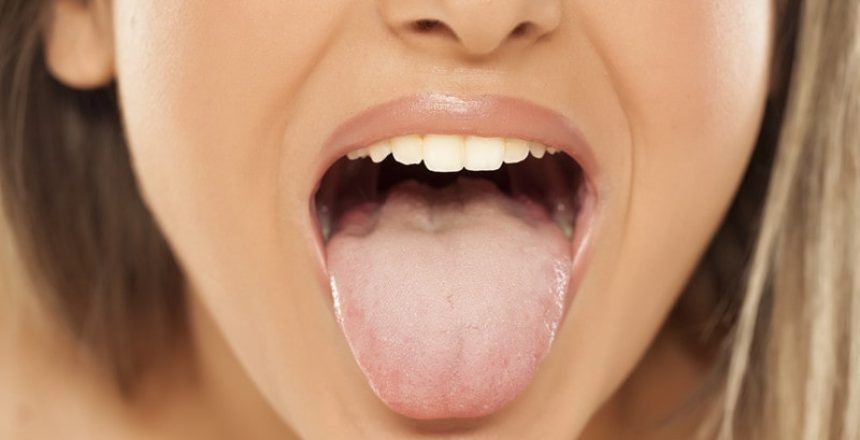The tongue may not be the window to your soul, but it certainly has a role to play as an indicator of what’s going on inside your body. You can tell if you have a health problem just by looking at its color and texture. However, pinpointing the problem you’re facing can be difficult. Fortunately, this article can help you figure out what you’re dealing with.
So, what does it mean when your tongue turns white? Learn about the most common causes of a white tongue below, and learn how to treat them.
Is white tongue bad?
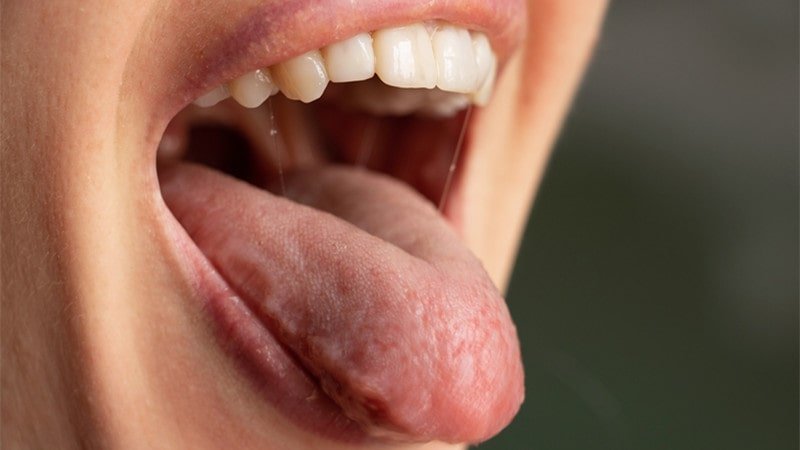
In fact, many people find that a white coating on the tongue is a common occurrence. It is basically caused by swelling and overgrowth of the mastoids on the surface of this organ. Typically, this white layer is caused by bacteria and debris adhering to the inflamed nipple.
While this condition can affect anyone, some people are generally more prone to it than others. You may find yourself battling white tongue symptoms on a regular basis due to some unhealthy habits or underlying health issues.
In this case, review the list of risk factors below to see what makes you so susceptible to this condition. Often, people who often have a white tongue are also:
• Weakened immune system
• have diabetes
• Very young (babies and toddlers) or very old
• Frequent use of antibiotics
• wearing dentures
• have hypothyroidism
• mouth breathing
• Not eating enough fruits and vegetables
• Smoking or chewing tobacco
• poor oral hygiene
• not drinking enough water
• Consume more than one alcoholic drink per day
• are undergoing cancer treatment
While white tongue isn’t necessarily harmful in itself, it can be an indicator of many underlying medical conditions. Therefore, it may be wise to see a dentist as soon as you get one. Or, you can try to rule out possible causes yourself—provided you’re not in too much pain.
What does it mean when your tongue turns white?
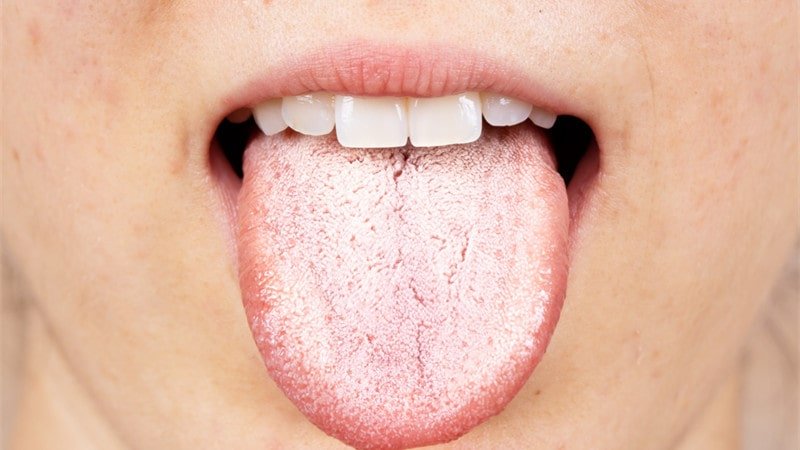
Getting to the root of your white tongue can be a daunting endeavor, especially if you have no other health-related problems. The reason is that this condition can be a symptom of several different diseases or unhealthy habits.
So to track down the culprit, you may want to first rule out issues that may not apply to you. Below, you’ll find some of the most common reasons you might have this condition.
What can cause a white tongue?
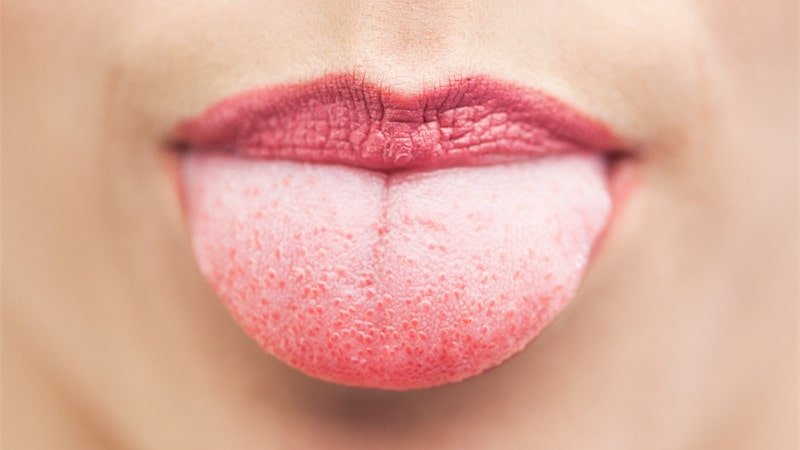
1. Poor oral hygiene
One of the least serious causes of a white tongue is inadequate dental and oral care. Meanwhile, poor oral hygiene is one of the most common reasons why this happens.
Small bumps (papillae) on the tongue can easily swell or become inflamed, and lose color in the process. In fact, this occurs due to an overgrowth of yeast and bacteria in the mouth. After all, thorough brushing and flossing won’t fix it.
2. Dehydration
Like poor oral hygiene above, dehydration can increase the number of bacteria in your mouth. As a result, it causes dry mouth and often white tongue.
Essentially, dry mouth is the perfect breeding ground for all kinds of bacteria. So if you’re not drinking enough water and rinsing/brushing and rinsing your mouth at least twice a day, you’ve probably found the source of your problem.
3. Thrush
Oral thrush can also cause white patches on the tongue—a fungal infection of the mastoid. If so, you may also notice a thick red coating. Therefore, a Candida overgrowth can be very unpleasant and can cause difficulty swallowing.
This condition can be directly related to a weakened immune system caused by diseases such as AIDS or diabetes. More commonly, though, it stems from B vitamin and iron deficiencies, which you can address simply by taking supplements.
4. Vitiligo
Vitiligo is a disease that affects the tongue, gums, and cheeks. This usually painless condition causes white patches to appear in the aforementioned areas of the mouth.
You are more likely to get vitiligo if you smoke or chew tobacco. But the good news is that the condition is harmless in most cases. Even so, people with leukoplakia may need to be wary, as leukoplakia can also increase the risk of oral cancer.
5. Geolanguage
Benign migratory glossitis is an inflammatory disease that occurs when the skin on the tongue regenerates. Also known as geographic tongue, it leaves bald red patches with white borders on the surface of this organ.
This disorder occurs when the upper layer of the tongue begins to fall off at different rates. So those that change too quickly usually turn red and become infected. On the other hand, some other parts of your tongue seem to stay intact for too long – leading to those annoying white spots.
6. Oral lichen planus
Unlike most of the white tongue causes on our list, oral lichen planus is a chronic condition. It refers to a long-lasting inflammatory oral disease that usually stems from an immune system disorder.
In addition to white patches on your tongue, you may notice redness and swelling. While these symptoms may never go away completely, you should be able to manage them with certain medications.
7. Syphilis
Syphilis is a sexually transmitted bacterial infection that primarily affects the genitals and rectum. In the mouth, it leaves sores or chancres near the tonsils, on the gums, and on the tip of the tongue.
As a result, the disease causes white tongue patches known as syphilitic leukoplakia. Fortunately, syphilis is highly treatable in its early stages. So if you suspect it, notify your dentist or primary care physician as soon as possible.
8. Other
If you don’t think any of the white tongue causes above are to blame for your condition, you may be dealing with something else. In fact, a white tongue can also be a symptom of:
• Soft food diet
• mechanical stimulation
• fever
• Tongue injury (bite or burn)
• mouth sores
• Mouth or tongue cancer
What are the symptoms of a white tongue?
In addition to a noticeable white coating on the tongue, you may experience several other symptoms associated with a white tongue. For example, you may not be able to chew, swallow, or speak.
You may also experience soreness in your mouth, and your tongue may seem to be burning all the time. Also, you are more likely to have bad breath.
How to Get Rid of White Tongue
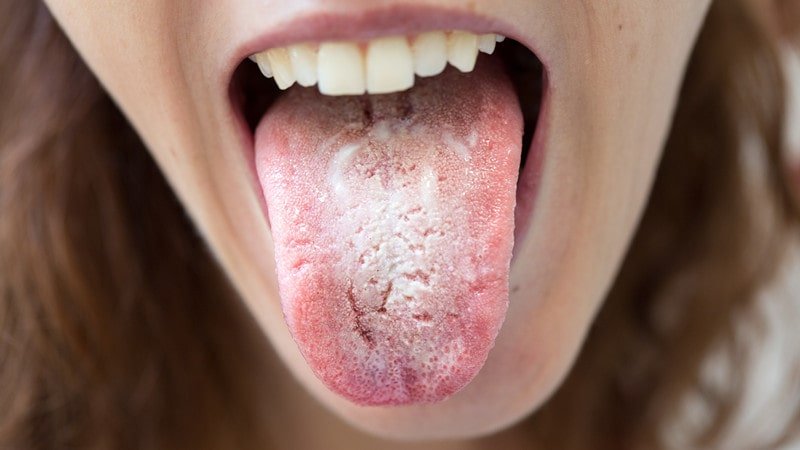
Regardless of the underlying condition, your white tongue should never go completely untreated. Rather than simply waiting until it goes away on its own, you should at least pay more attention to practicing good oral hygiene habits. Keep yourself hydrated and kick bad habits.
Depending on the exact cause of white tongue, you may need more serious treatment. If so, see your dentist or appropriate care physician quickly. They may perform a biopsy before giving you a proper diagnosis. Unfortunately, some causes of white tongue may only be treatable with prescription medications.
On the other hand, less serious cases do not require hospitalization. In this case, consider the following home remedies for white tongue.
10 Natural Remedies for White Tongue at Home
1. Maintain good oral hygiene
If you’re lucky, your situation will only require a few extra brushes per day. Even if it’s not the main cause of a white tongue, maintaining proper oral hygiene can be a possible path to your recovery.
So, remember to brush your teeth and gums several times a day — after every meal. Another good idea might be tongue scraping, which removes the white coating and treats bad breath.
2. Eat garlic
If you doubt garlic can solve your mouth and breathing problems – you may not be alone. Still, all skeptical Thomases will find this natural remedy to be one of the most effective for white tongue.
The plant has some antifungal properties that allow it to fight diseases like thrush. For example, an active compound (allicin) found in garlic appears to have some antimicrobial properties.
3. Rinse with Aloe Vera Juice
As an excellent source of antioxidants, aloe vera juice can reduce the risk of chronic diseases such as diabetes, heart disease and even cancer. It also has anti-fungal, anti-bacterial, and anti-inflammatory properties to help combat transient conditions.
Therefore, you can use it to treat infections, skin irritations, and wounds such as white and red patches on the tongue. All you need to do is treat your mouth with a tablespoon of aloe vera juice daily.
4. Make a Sea Salt Mouthwash
Because of its natural antimicrobial activity, sea salt may prove beneficial in treating certain oral infections. So, make a mouthwash by mixing some sea salt with water, and remember to apply it before brushing.
This substance is less processed than table salt but rich in nutrients and minerals that may help improve your condition. You can also use it to exfoliate your tongue, which removes the white coating on it.
5. Use Baking Soda
These days, it’s common to use baking soda for things other than baking cakes and muffins. Due to this compound’s many beneficial properties, it may have found a place in your medicine cabinet.
Fortunately, you can use baking soda to exfoliate your tongue and remove the layer of white debris around your tongue. A simple mix of this compound and lemon juice in your toothpaste can help your mouth maintain a good pH.
6. Coconut Oil Detox
Among its many benefits, coconut oil appears to reduce inflammation by reducing the number of harmful bacteria. This mouthwash technique, known as coconut oil aspiration, actually “draws” bacteria from your mouth, moisturizes your gums, and increases saliva production.
You can try holding a tablespoon of coconut oil in your mouth for 10-20 minutes. After spit out, rinse mouth with warm water and brush teeth.
7. Use colloidal silver
Colloidal silver is a natural remedy for many health-related problems, including cancer, herpes, and skin diseases. Due to its antibacterial and antifungal properties, colloidal silver can reduce various inflammations and promote cellular recovery.
If you want to say goodbye to the white coating on your tongue, just one tablespoon of colloidal silver twice a day is all you need. Add some water and swish the mixture in your mouth for about five minutes.
8. Drink Pau D’arco tea
Pau D’Arco is a tree native to Brazil that is believed to heal many diseases. It appears to suppress inflammation and help reduce pain, reduce ulcers and boils, and treat many types of cancer.
Therefore, it may be a natural way to kill candida and treat thrush at home. For a remedy, add two cups of bark to four cups of boiling water. Let the mixture sit for 20 minutes, then cool for an hour. Finally, strain your tea and enjoy sipping throughout the day.
9. Try oregano oil
Like many of the white tongue remedies on our list, oil of oregano has considerable health benefits. It can help fight a range of bacteria and fungi, reduce inflammation, and heal wounds.
Therefore, oregano oil is thought to combat Candida albicans in vivo and in vitro in mice. To use it for a whiter tongue, mix two drops of this oil with a glass of water.
10. Take probiotics
As you know, not all bacteria are bad – many are even good for your health and are essential to the balanced function of our bodies. However, an imbalance of healthy bacteria in the stomach can cause the tongue to turn white.
To regulate your gut bacteria, you can try consuming probiotic foods. You can also prevent potential infections by including a probiotic supplement in your daily diet.
